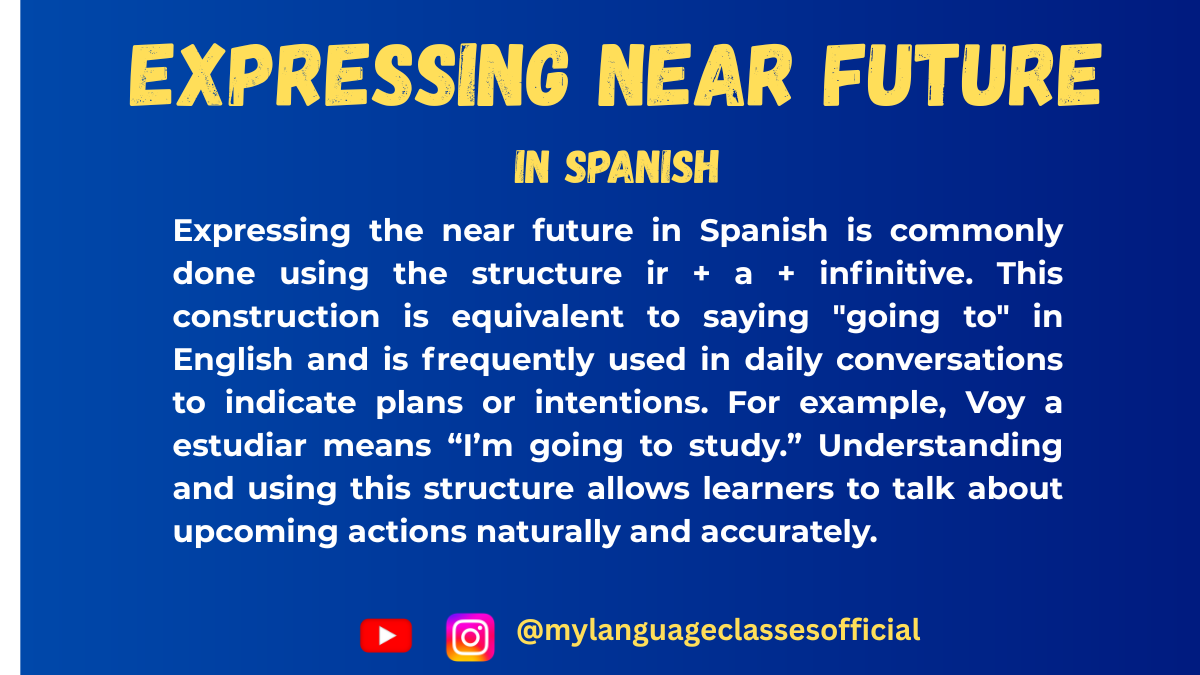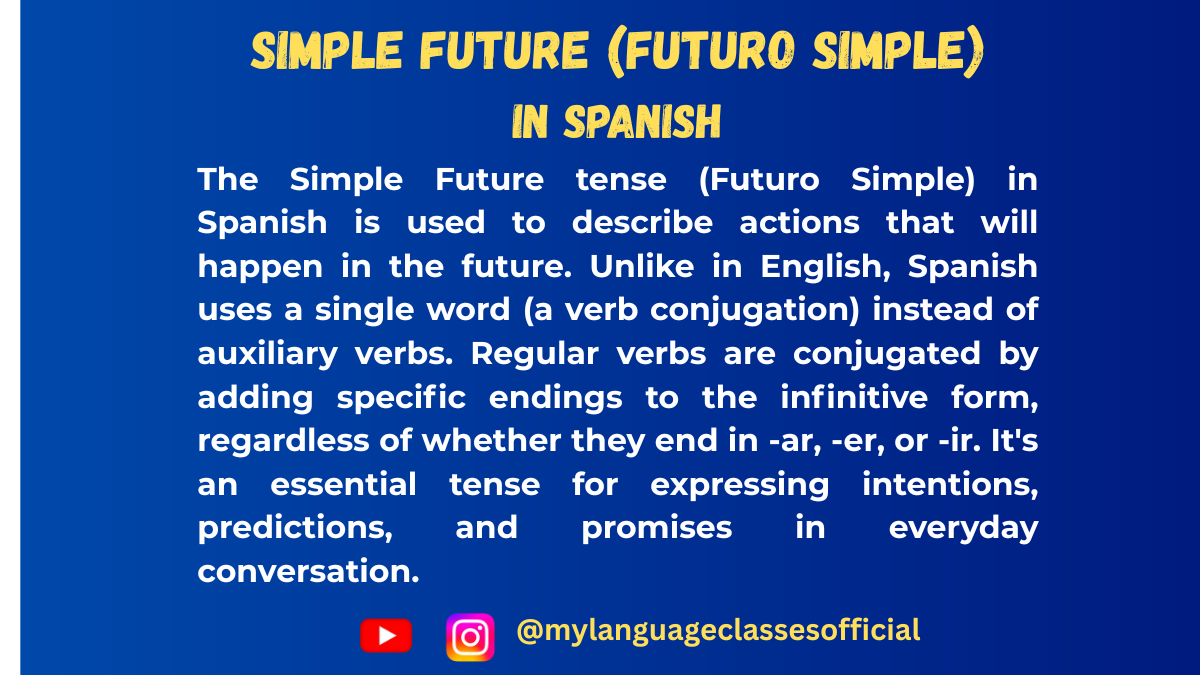Your cart is currently empty!
Tag: Spanish future tense examples
-

Ir a + Infinitive: Expressing Near Future in Spanish
In Spanish, the construction “Ir a + infinitive” is commonly used to express actions that will happen in the near future. This is equivalent to the English “going to + verb” structure. It is widely used in spoken and written Spanish and is easier to learn compared to the simple future tense.
Formation of “Ir a + Infinitive”
The structure consists of three elements:
- The verb “ir” (to go) conjugated in the present tense.
- The preposition “a” (to).
- An infinitive verb (unconjugated verb).
Conjugation of “Ir” in Present Tense:
Subject Pronoun Conjugation of “Ir” Yo voy Tú vas Él/Ella/Usted va Nosotros/as vamos Vosotros/as vais Ellos/Ellas/Ustedes van Sentence Structure:
Subject + Ir (conjugated) + a + Infinitive Verb
Example Sentences:
- Voy a estudiar. (I am going to study.)
- Vamos a viajar a México. (We are going to travel to Mexico.)
- Ellos van a comprar una casa. (They are going to buy a house.)
Usage of “Ir a + Infinitive”
1. Near Future Actions
Used to express something that is about to happen soon.
- Voy a llamar a mi madre. (I am going to call my mother.)
- Ella va a cocinar la cena. (She is going to cook dinner.)
2. Intentions or Plans
Used when someone has planned to do something.
- Vamos a ver una película esta noche. (We are going to watch a movie tonight.)
- Voy a aprender español este año. (I am going to learn Spanish this year.)
3. Predictions Based on Evidence
Used when there is evidence that something is about to happen.
- Va a llover. (It is going to rain.)
- El bebé va a llorar. (The baby is going to cry.)
4. Giving Commands or Warnings
Used to give warnings or strong suggestions.
- Vas a romper el vaso. (You are going to break the glass.)
- Van a llegar tarde si no se apuran. (You all are going to be late if you don’t hurry.)
Articles, Gender, and Plural Considerations
When using “Ir a + Infinitive,” remember:
- Definite Articles (el, la, los, las) and Indefinite Articles (un, una, unos, unas) should match the noun in gender and number.
- Example: Voy a comprar una bicicleta. (I am going to buy a bicycle.)
- Example: Vamos a visitar el museo. (We are going to visit the museum.)
- Verb agreement: The conjugation of “ir” changes based on the subject.
- The infinitive verb does not change regardless of the subject.
Common Verbs Used with “Ir a + Infinitive”
Here is a list of common verbs and their “Ir a + Infinitive” forms:
Infinitive Verb Meaning “Ir a + Infinitive” Example Comer To eat Voy a comer pizza. (I am going to eat pizza.) Beber To drink Vas a beber agua. (You are going to drink water.) Estudiar To study Ella va a estudiar matemáticas. (She is going to study mathematics.) Viajar To travel Vamos a viajar a España. (We are going to travel to Spain.) Comprar To buy Van a comprar un coche. (They are going to buy a car.) Hacer To do/make Voy a hacer mi tarea. (I am going to do my homework.) Tener To have Vas a tener una sorpresa. (You are going to have a surprise.) Llegar To arrive Ella va a llegar temprano. (She is going to arrive early.) Jugar To play Vamos a jugar fútbol. (We are going to play soccer.) Dormir To sleep Van a dormir temprano. (They are going to sleep early.) Regular and Irregular Verbs in “Ir a + Infinitive”
All verbs, whether regular or irregular, remain in the infinitive form after “a.”
Regular Verbs (AR, ER, IR Verbs)
- Hablar (to speak): Voy a hablar con mi amigo. (I am going to speak with my friend.)
- Comer (to eat): Vamos a comer paella. (We are going to eat paella.)
- Vivir (to live): Ellos van a vivir en Barcelona. (They are going to live in Barcelona.)
Irregular Verbs
- Hacer (to do/make): Voy a hacer la tarea. (I am going to do the homework.)
- Tener (to have): Ella va a tener una fiesta. (She is going to have a party.)
- Poder (to be able to): Van a poder salir temprano. (They are going to be able to leave early.)
Conclusion
The “Ir a + Infinitive” structure is one of the most practical and commonly used ways to express the near future in Spanish. It is simple to form and widely understood in all Spanish-speaking regions. By practicing this structure with different verbs, you can quickly improve your Spanish fluency and express future plans with confidence.
Now that you understand how to use “Ir a + Infinitive”, start practicing by forming your own sentences!
If you enjoyed this lesson, be sure to check out more posts like this on my blog at My Language Classes. Don’t forget to subscribe my YouTube channel and follow me on Instagram for the latest language learning tips and lessons. Leave a comment below to share your thoughts, or ask any questions you have.
Happy learning! 😊

